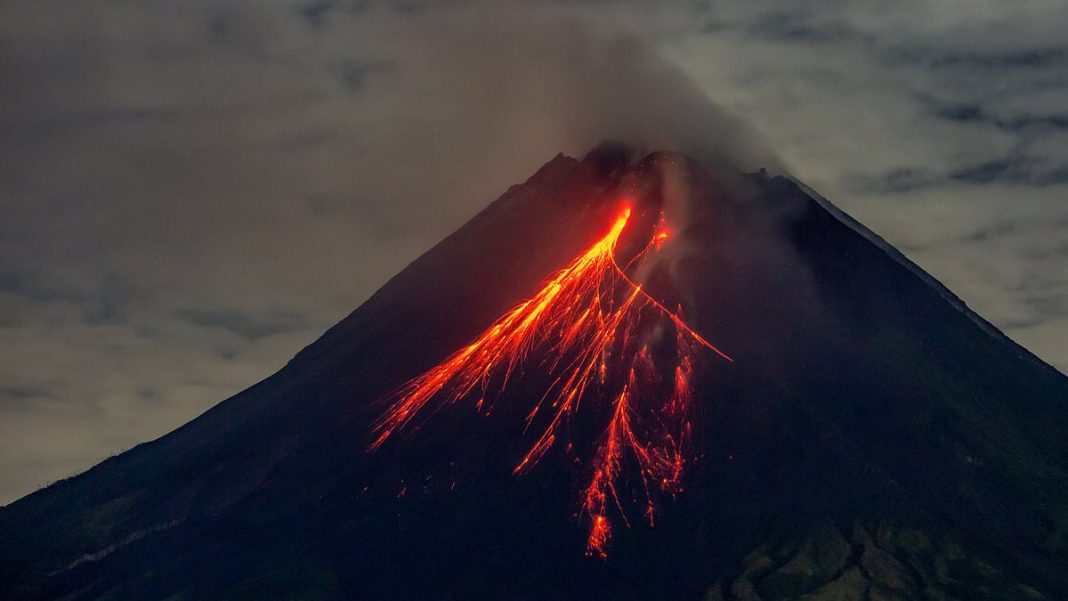A volcano in eastern Indonesia erupted overnight, killing at least 10 people as it spewed fireballs and ash on surrounding villages, officials said Monday as they raised the alert to its highest level.
Mount Lewotobi Laki-Laki, a 1,703-metre (5,587-feet) twin volcano located on the popular tourist island of Flores, erupted shortly before midnight, forcing authorities to evacuate several villages.
Residents described their horror when the crater started shooting flaming rocks at their homes.
‘I was asleep when suddenly the bed shook twice, as if someone had slammed it. Then I realised the volcano had erupted, so I ran outside,’ said 32-year-old hairdresser Hermanus Mite.
‘I saw flames coming out and immediately fled. There were ashes and stones everywhere. My salon also caught fire and everything inside was lost.’
Abdul Muhari, spokesman of the country’s disaster mitigation agency (BNPB), confirmed the death toll at a press conference, adding that 10,295 people had been affected by the eruptions.
He said the number of evacuees was still being calculated.
An AFP journalist near the volcano said five villages were evacuated, forcing thousands of people to seek shelter elsewhere.
Buildings near the volcano were covered by thick ash while some wooden homes caught fire, and the ground was pockmarked with holes caused by flying molten rocks.
The crater erupted just before midnight and then again at 1:27 am (1727 GMT Sunday) and 2:48 am, the country’s volcanology agency said.
The volcanology agency hoisted the highest alert level and told locals and tourists not to carry out activities within a seven-kilometre (4.3-mile) radius of the crater.
‘There has been a significant increase in volcanic activity on Mount Lewotobi Laki-Laki,’ it said in a press release Monday.
It released images that showed the roofs of houses collapsed after they were hit by volcanic rocks, and locals sheltering in communal buildings.
Locals said the initial eruption was masked by adverse weather conditions.
‘We didn’t hear any warning signs because it started with thunder and lightning,’ said Petrus Muda Turan, head of a village on the Catholic-majority island, adding that the dead included a baby and a young nun.
‘After midnight, people finally began to evacuate in a panic. When we ran, we didn’t know what to bring, so we just took ourselves.’
Authorities warned there was a potential for rain-induced lava floods and advised people to wear masks to protect against volcanic ash.
Abdul from the disaster agency said an airport in Maumere, the second-largest town on Flores, had been temporarily closed and a desk had been set up for locals to report any missing relatives.
There were multiple tremors and eruptions at the volcano last week, sending columns of ash between 500 and 2,000 metres (6,500 feet) into the sky several days in a row.
Laki-Laki, which means ‘man’ in Indonesian, is twinned with a calmer volcano named after the Indonesian word for ‘woman’.
The mountain had several major eruptions in January, prompting authorities to evacuate at least 2,000 residents.
Indonesia, a vast archipelago nation, experiences frequent eruptions due to its position on the Pacific ‘Ring of Fire’, an area of intense volcanic and seismic activity.
In December last year, an eruption at one of the country’s most active volcanoes, Mount Marapi in West Sumatra, killed at least 24 climbers, most of them university students.
And in May, more than 60 people died after heavy rains washed volcanic material from Marapi into residential areas, sweeping away homes.
That month, Mount Ruang in North Sulawesi province erupted more than half a dozen times, forcing thousands of people on nearby islands to evacuate.









